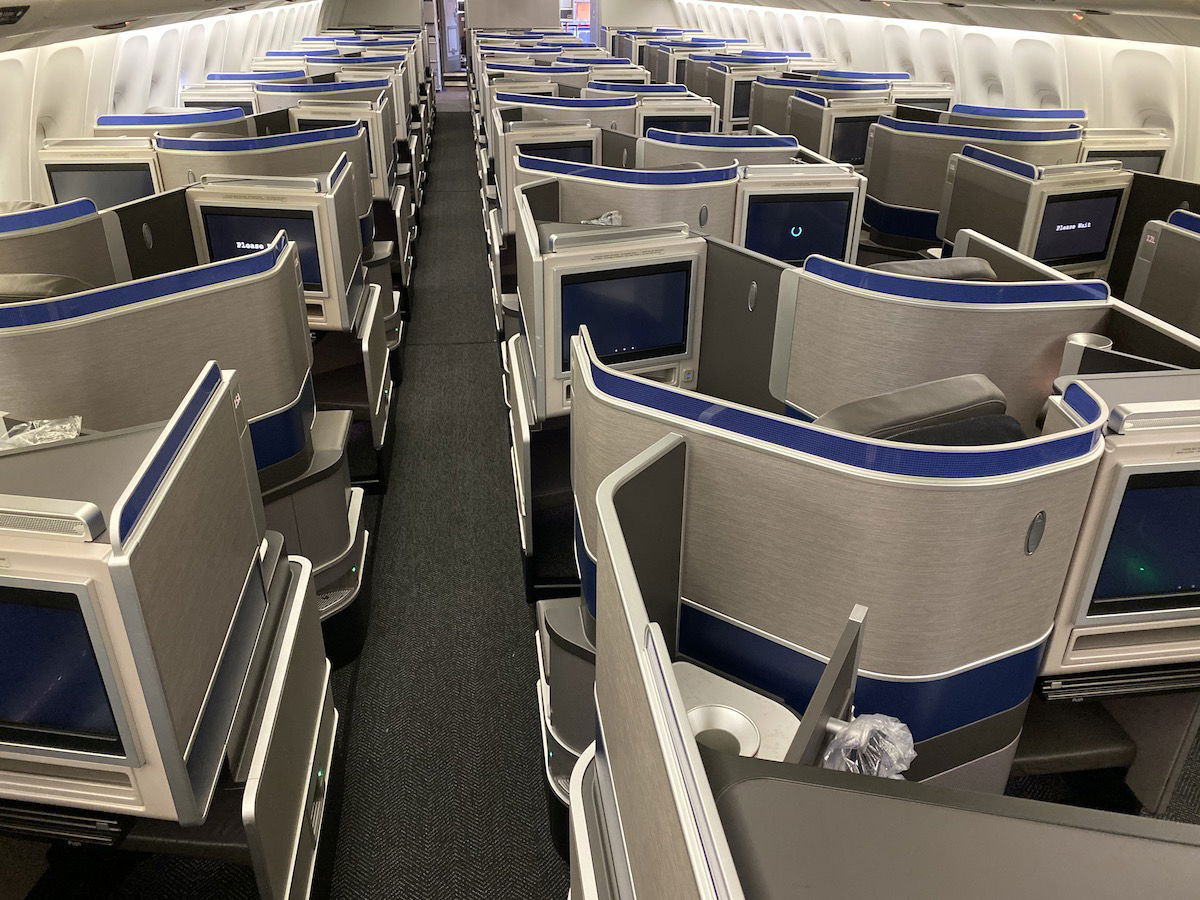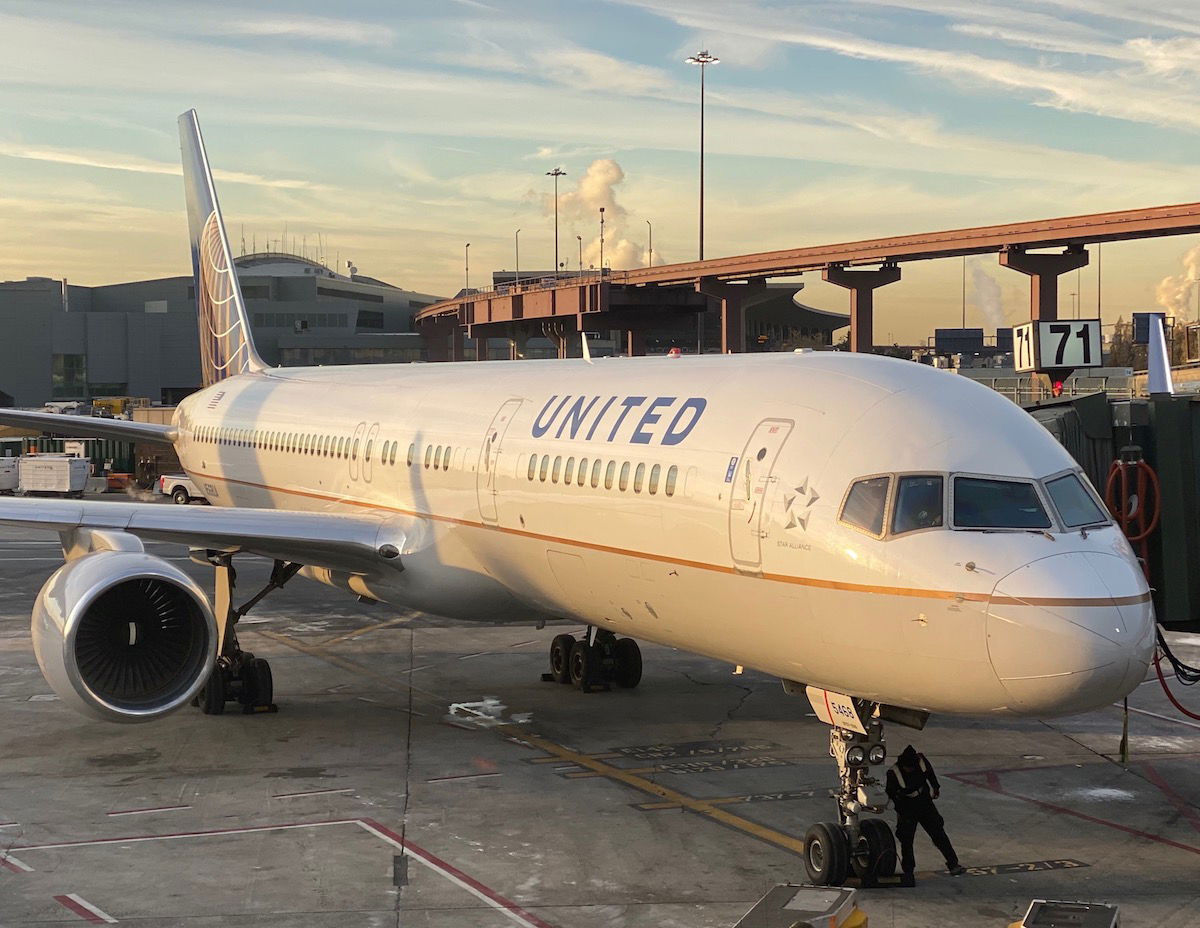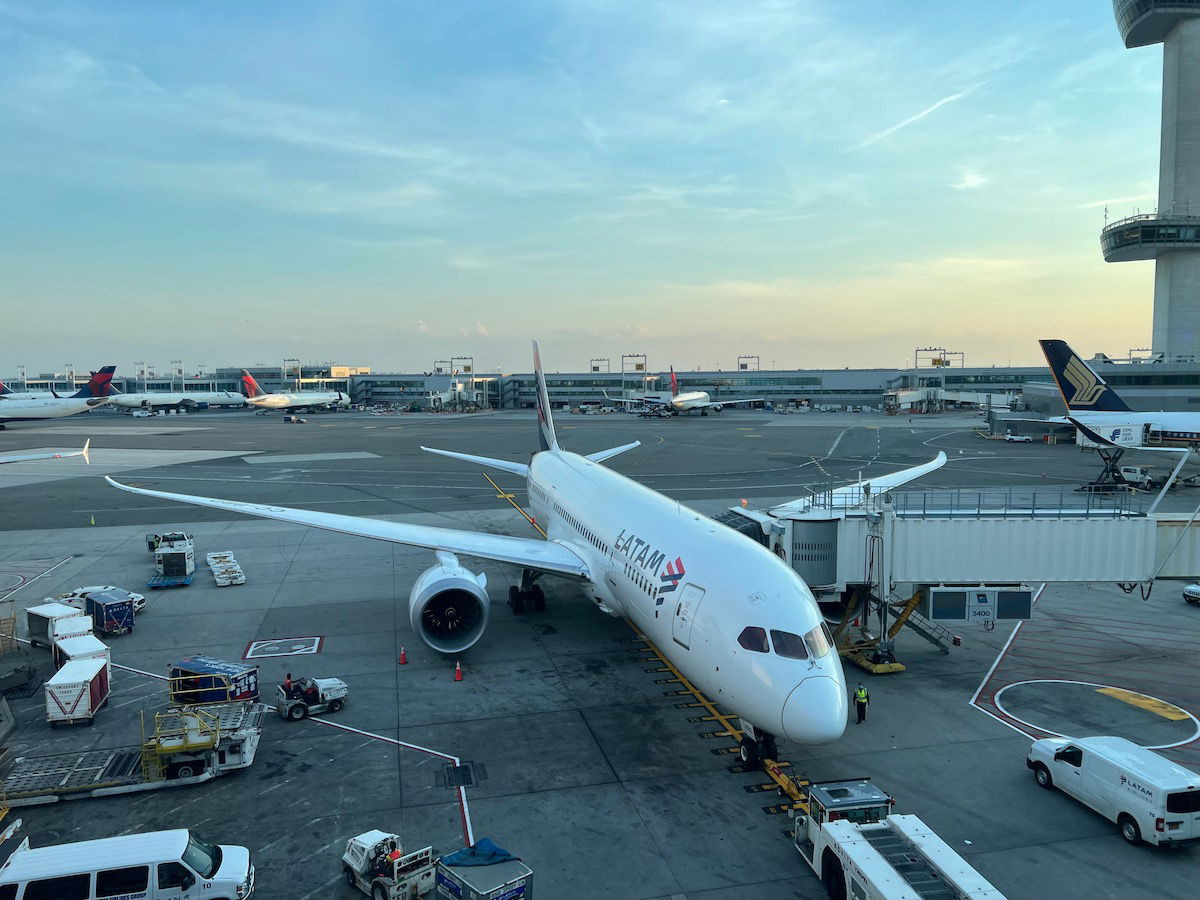Does United Airlines Fly Into Jfk? Yes, but the story is more complex than a simple yes or no. Currently, United Airlines has temporarily suspended services at John F. Kennedy International Airport (JFK) as of late October 2022 due to challenges in securing permanent flight slots. For aviation enthusiasts and frequent flyers seeking the latest updates on airline operations, route changes, and airport developments, flyermedia.net is your go-to resource. Discover comprehensive insights into airline strategies, airport slot management, and the impact of these decisions on air travel.
This article explores the reasons behind United’s decision, the implications for travelers, and the broader context of slot-controlled airports. You’ll find detailed analyses of United Airlines’ JFK operations, slot allocation disputes, and the potential future of United at JFK, along with expert opinions and reliable sources, including insights from aviation authorities and airline management, such as the FAA.
1. Understanding United Airlines’ JFK Operations
1.1 United’s Initial Exit and Subsequent Return to JFK
United Airlines had previously ceased operations at JFK in 2015, choosing instead to consolidate its services at Newark Liberty International Airport (EWR). This decision was driven by the belief that focusing on EWR would better serve their New York-area customer base. However, the airline later recognized that abandoning JFK was a misstep, as it struggled to capture a significant portion of the New York market solely from Newark.
In the spring of 2021, United Airlines made a comeback to JFK, offering flights to key destinations such as Los Angeles (LAX) and San Francisco (SFO). This return was facilitated by the availability of temporary flight slots, which had opened up due to the reduced air traffic during the COVID-19 pandemic. According to United Airlines CEO Scott Kirby, returning to JFK was essential to regain market share and provide better service to its customers.
 United Airlines returned to JFK in 2021
United Airlines returned to JFK in 2021
1.2 The Importance of JFK Airport and Slot Restrictions
John F. Kennedy International Airport (JFK) is one of the busiest and most important airports in the United States, serving as a major international gateway and a hub for numerous airlines. Due to its high traffic volume and limited capacity, JFK is designated as a slot-controlled airport. This means that airlines must obtain slots—permissions to take off or land at specific times—before operating flights at the airport.
Slot restrictions are implemented by aviation authorities, such as the Federal Aviation Administration (FAA), to manage congestion, optimize airport efficiency, and ensure fair access to airport resources. These restrictions can pose significant challenges for airlines looking to expand their operations or enter new markets.
1.3 United’s Strategy for Securing Slots at JFK
Upon its return to JFK in 2021, United Airlines aimed to secure permanent flight slots to establish a sustainable and competitive presence at the airport. The airline pursued various strategies to achieve this goal, including:
- Negotiating with the FAA: United Airlines engaged in discussions with the FAA to request additional permanent slots, emphasizing the benefits of increased competition and improved service for consumers.
- Seeking Commercial Agreements: The airline explored opportunities to acquire slots from other airlines through commercial agreements, such as slot swaps or purchases.
- Advocating for Increased Capacity: United Airlines argued that the FAA should increase the overall capacity at JFK by adding more hourly slots, citing improvements in airport infrastructure since 2008.
2. The Slot Dispute and United’s Decision to Suspend Service
2.1 United’s Concerns Over Competitiveness at JFK
Despite its efforts to secure permanent slots, United Airlines faced significant challenges in competing with other major carriers at JFK, particularly JetBlue and American Airlines. These airlines had a larger presence at the airport and offered more frequent flights to key destinations, such as Los Angeles.
United Airlines management expressed concerns that without permanent slots, the airline could not effectively compete at JFK. They argued that the temporary slots they were using were insufficient to support a sustainable operation and provide customers with attractive flight times and convenient connections. According to a memo sent to employees, United needed more slots to “serve JFK effectively compared to the larger schedules and more attractive flight times flown by our competitors.”
2.2 The FAA’s Stance on Slot Allocation
The FAA’s decision-making process regarding slot allocation is complex and takes into account various factors, including airport capacity, air traffic control considerations, and the interests of different airlines. The FAA has been cautious about increasing the number of slots at JFK due to concerns about congestion and potential delays.
In the case of United Airlines, the FAA did not grant the airline’s request for additional permanent slots. This decision was influenced by the fact that United had previously relinquished its slots at JFK in 2015 and was now seeking to regain them after other airlines had already established their presence at the airport.
2.3 The Decision to Suspend Flights
Faced with the inability to secure permanent slots and concerns about its competitiveness at JFK, United Airlines made the difficult decision to temporarily suspend service at the airport. Effective in late October 2022, the airline discontinued its flights to Los Angeles and San Francisco, consolidating its operations at Newark Liberty International Airport.
United Airlines described this decision as a temporary suspension, indicating its desire to return to JFK with a more substantial presence in the future. However, the airline acknowledged that it would need to acquire a significant number of slots to make such a return feasible.
 United is pulling out of JFK
United is pulling out of JFK
3. Implications for Travelers and the Aviation Industry
3.1 Impact on Passengers
The suspension of United Airlines’ flights at JFK has several implications for passengers:
- Reduced Choice: Passengers who previously relied on United for flights to Los Angeles and San Francisco from JFK now have fewer options and may need to consider alternative airlines or connecting flights.
- Potential Fare Increases: With one less competitor on these routes, other airlines may have less incentive to offer competitive fares, potentially leading to higher prices for travelers.
- Inconvenience for Some Travelers: Passengers who preferred flying United out of JFK due to its location or other factors may find the consolidation of operations at Newark inconvenient.
3.2 Effects on Competition and Market Dynamics
United Airlines’ departure from JFK could have broader effects on competition and market dynamics in the New York area:
- Increased Market Share for Competitors: JetBlue and American Airlines, the two largest carriers at JFK, stand to gain market share as a result of United’s withdrawal.
- Potential for New Entrants: The availability of slots previously held by United could create opportunities for new airlines to enter the JFK market or for existing airlines to expand their operations.
- Pressure on Newark Airport: The consolidation of United’s operations at Newark could put additional strain on the airport’s infrastructure and resources, potentially leading to congestion and delays.
3.3 Broader Implications for Slot-Controlled Airports
The situation at JFK highlights the challenges and complexities of operating at slot-controlled airports. It underscores the importance of:
- Efficient Slot Allocation: Aviation authorities must develop fair and transparent processes for allocating slots to ensure that airports are used efficiently and that airlines have opportunities to compete.
- Infrastructure Investment: Continued investment in airport infrastructure, such as runways, terminals, and air traffic control systems, is essential to increase capacity and accommodate growing demand.
- Flexibility and Adaptability: Airlines must be flexible and adaptable in their strategies, recognizing that slot availability and market conditions can change rapidly.
4. Expert Opinions and Industry Insights
4.1 Analysis from Aviation Experts
Aviation experts have offered various perspectives on United Airlines’ decision to suspend service at JFK:
- Ben Schlappig, One Mile at a Time: “While I think United returning to JFK was ultimately good for competition, I also think United was unrealistic here. The airline traded its slots at the airport, and then temporarily got some slots when demand was way down. With demand recovering, it’s no surprise that these slots won’t be made permanent.”
- Seth Miller, The Points Guy: “United’s departure from JFK is a loss for consumers, as it reduces competition and choice on key routes. However, it also highlights the challenges that airlines face in securing slots at congested airports.”
- Henry Harteveldt, Atmosphere Research Group: “United’s decision is a strategic one, as the airline is focusing on markets where it can be more competitive. However, it also underscores the need for the FAA to modernize its slot allocation process to ensure that airports are used efficiently.”
4.2 United Airlines’ Perspective
United Airlines has emphasized that its decision to suspend service at JFK is a temporary one and that it remains committed to serving the New York market. The airline has stated that it will continue to seek opportunities to acquire additional slots at JFK and that it hopes to resume flights at the airport in the future.
In a statement, United Airlines said: “Given our current, too-small-to-be-competitive schedule out of JFK — coupled with the start of the winter season where more airlines will operate their slots as they resume JFK flying — United has made the difficult decision to temporarily suspend service at JFK.”
4.3 The FAA’s Position
The FAA has acknowledged United Airlines’ concerns about slot availability at JFK but has also emphasized its responsibility to manage congestion and ensure fair access to airport resources for all airlines. The FAA has stated that it will continue to work with airlines to optimize slot allocation and improve airport efficiency.
According to the FAA, “The FAA is committed to ensuring that JFK operates safely and efficiently. We will continue to work with all stakeholders to address the challenges of slot allocation and airport capacity.”
5. The Future of United at JFK: Possible Scenarios
5.1 Acquiring Slots Through Commercial Agreements
One possible scenario for United Airlines’ return to JFK is through the acquisition of slots from other airlines via commercial agreements. This could involve slot swaps, purchases, or joint ventures. However, securing such agreements can be challenging, as airlines may be reluctant to give up valuable slots at a major airport like JFK.
5.2 FAA Intervention and Slot Reallocation
Another scenario is that the FAA could intervene and reallocate slots at JFK to promote competition and improve service for consumers. This could involve taking slots from airlines that are not using them efficiently or creating new slots through infrastructure improvements. However, such interventions can be controversial and may face legal challenges from airlines that stand to lose slots.
5.3 Long-Term Capacity Expansion at JFK
In the long term, the expansion of capacity at JFK through infrastructure projects could create more opportunities for United Airlines and other airlines to operate flights at the airport. The ongoing redevelopment of JFK, which includes the construction of new terminals and the modernization of air traffic control systems, could eventually lead to an increase in the number of available slots.
 JFK is a slot restricted airport
JFK is a slot restricted airport
6. Addressing the Elephant in the Room
6.1 Contradictory Arguments
The reason United Airlines left JFK in the first place was to consolidate services at Newark Liberty International Airport (EWR). Then the airline wanted to expand JFK slots but argues against expanding EWR slots. United Airlines even claimed that ultra low cost carriers would be bad for consumers.
United voluntarily left JFK back in 2015, then played the victim card a few weeks ago. Why should United be granted permanent slots at JFK, rather than an airline that never had the opportunity to fly there?
6.2 JFK Airport Redevelopment Project
JFK is currently undergoing a major redevelopment project, so this might not be the time to expand capacity at the airport, even if the runways are able to handle it
When United returned to JFK, the airline knew it was only getting temporary slots, so it seems unrealistic that the airline thought it would easily be able to acquire permanent slots.
6.3 All or Nothing Approach
United took an all-or-nothing approach here, and wanted a multi-season slot allocation, or else the airline would leave the airport (which is what United is doing now)
7. Conclusion: United’s JFK Dilemma
In conclusion, United Airlines’ current status at JFK is one of temporary suspension, driven by the challenges of securing permanent flight slots and maintaining a competitive presence. While the airline has expressed its desire to return to JFK in the future, the path to achieving this goal is uncertain. The situation highlights the complexities of operating at slot-controlled airports and the importance of efficient slot allocation, infrastructure investment, and strategic flexibility.
For travelers, the suspension of United Airlines’ flights at JFK means reduced choice and potential fare increases on key routes. For the aviation industry, it underscores the need for ongoing efforts to optimize airport capacity and promote competition. As the future of United at JFK remains uncertain, aviation enthusiasts and industry professionals will continue to monitor developments and analyze the implications for the New York market and the broader aviation landscape.
8. Call to Action: Stay Informed with flyermedia.net
Are you passionate about aviation and eager to stay up-to-date on the latest news, insights, and developments in the industry? Visit flyermedia.net today to explore a wealth of information on airline operations, airport developments, and aviation technology. Whether you’re a seasoned traveler, an aviation professional, or simply an enthusiast, flyermedia.net is your go-to resource for all things aviation.
Discover in-depth articles, expert analysis, and breaking news on a wide range of topics, including:
- Airline route changes and expansions
- Airport infrastructure projects
- Aviation safety and security
- New aircraft technologies
- Travel tips and advice
Join the flyermedia.net community and stay informed about the ever-evolving world of aviation.
9. FAQ: United Airlines and JFK Airport
9.1 Did United Airlines stop flying into JFK?
Yes, United Airlines has temporarily suspended its flights into JFK as of late October 2022. This decision was due to the airline’s inability to secure permanent flight slots at the airport.
9.2 Why did United Airlines leave JFK?
United Airlines left JFK because it could not obtain enough permanent slots to compete effectively with other airlines. The airline had been operating with temporary slots and sought a more substantial allocation for long-term viability.
9.3 When did United Airlines return to JFK?
United Airlines returned to JFK in the spring of 2021 after ceasing operations there in 2015. The return was facilitated by the availability of temporary flight slots during the COVID-19 pandemic.
9.4 Will United Airlines fly into JFK again?
United Airlines has expressed its desire to return to JFK in the future, but this will depend on its ability to acquire additional flight slots. The airline may seek to obtain slots through commercial agreements or hope for changes in slot allocation policies.
9.5 What destinations did United Airlines serve from JFK?
Prior to suspending its service, United Airlines flew from JFK to Los Angeles (LAX) and San Francisco (SFO).
9.6 How can I find alternative flights from JFK?
Passengers looking for alternative flights from JFK can explore options with other airlines such as JetBlue, American Airlines, and Delta. Online travel agencies and airline websites can help compare routes and fares.
9.7 What are flight slots and why are they important?
Flight slots are permissions to take off or land at an airport during a specific time. They are crucial for managing airport congestion and ensuring efficient operations, especially at busy airports like JFK.
9.8 How does the FAA allocate flight slots?
The FAA allocates flight slots based on various factors, including airport capacity, air traffic control considerations, and the interests of different airlines. The process aims to balance efficiency, competition, and access to airport resources.
9.9 What impact does United’s departure have on airfares?
United’s departure from JFK could potentially lead to higher airfares on routes where it competed, as other airlines may have less incentive to offer competitive pricing.
9.10 Where can I get updates on United Airlines’ plans for JFK?
For the latest updates on United Airlines’ plans for JFK, you can visit the airline’s official website, follow aviation news outlets, and stay tuned to flyermedia.net for in-depth coverage and analysis.
Address: 600 S Clyde Morris Blvd, Daytona Beach, FL 32114, United States
Phone: +1 (386) 226-6000
Website: flyermedia.net
Fly safely, and stay informed!